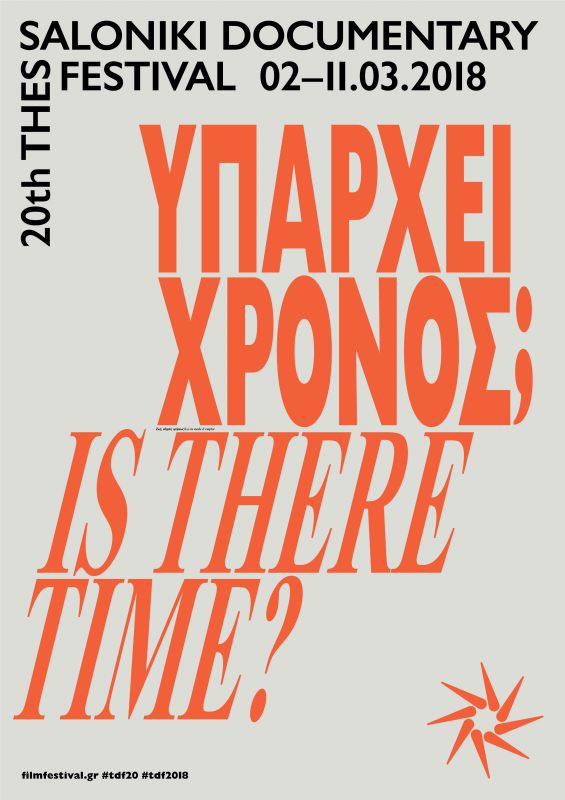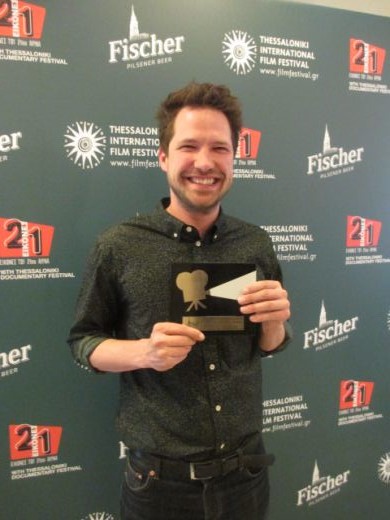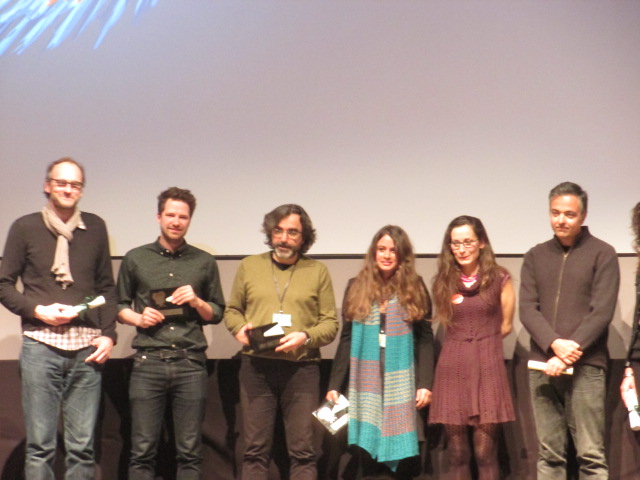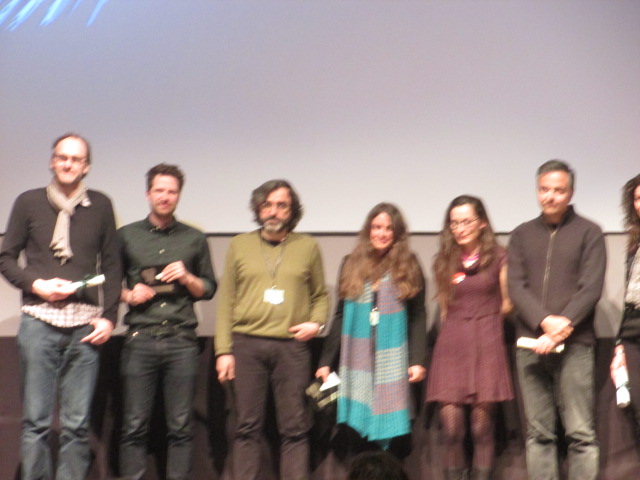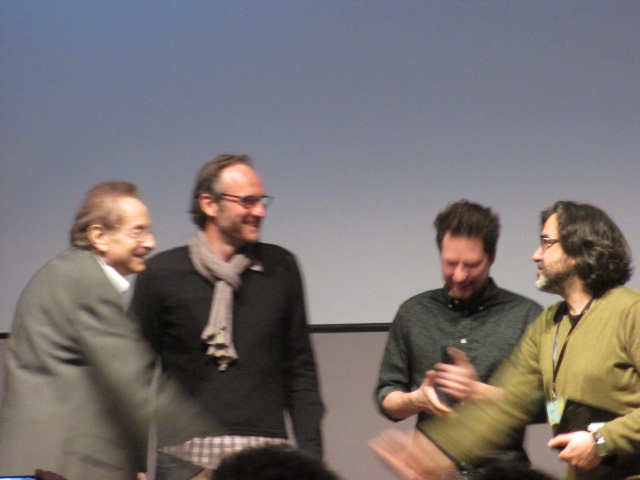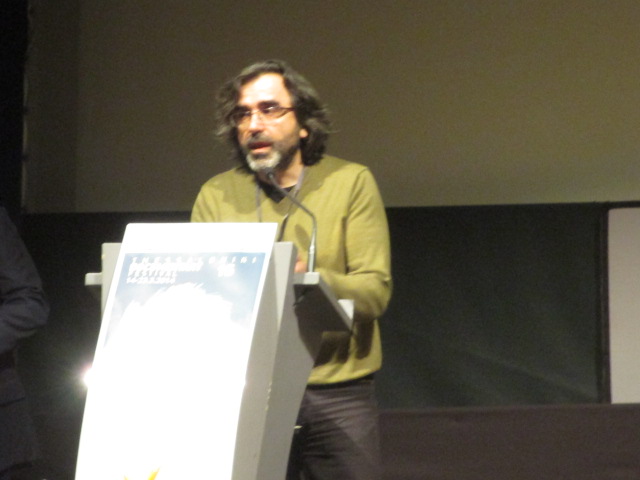|
|
||
|
Pro Tools
FILMFESTIVALS | 24/7 world wide coverageWelcome ! Enjoy the best of both worlds: Film & Festival News, exploring the best of the film festivals community. Launched in 1995, relentlessly connecting films to festivals, documenting and promoting festivals worldwide. Working on an upgrade soon. For collaboration, editorial contributions, or publicity, please send us an email here. User login |
PRESS CONFERENCE- The Art of Crisis, Theatre Matters / Bref / Playing with Fire / The Lost Signal of Democracy In Bref, Christina Pitouli examines the issue of clitoridectomy, presenting interviews with African immigrants who live in Spain. The director said that she was influenced by a documentary Yorgos Avgeropoulos had made on the same issue. “I live in Barcelona, a city with a large population of immigrants from Africa. I met with several of them and also came in touch with the Doctors Without Borders, an NGO who is organizing an African campaign to raise awareness on the issue of clitoridectomy,” said Pitouli. The film presents conflicting experiences and views about this brutal form of mutilation, which is inconceivable in Western culture, but has deep roots in African tradition. “The film shows men saying they are against clitoridectomy and women who support it. This proves that opinions are more nuanced and not gender-based. My intention was not simply to inform the audience about the issue and its consequences. I wanted to make every phrase, every testimony to inspire new debates, in the hope that something good will come out of the discussions.”
The shutdown of Greece’s former broadcaster ERT on the night of June 11, 2013 is the theme of the documentary The lost signal of democracy by Yorgos Avgeropoulos. As Avgeropoulos explained, he started shooting a couple of hours before the shutdown was announced. “On June 11, I started hearing from as early as 3 pm the inconceivable rumour that the closure of ERT was imminent. For us, ERT was like the police or the fire department, something always there. I took my camera and went to the studios in Agia Paraskevi; tensions were building high, and there were many ERT employees gathered there, waiting for the government spokesman to make the announcement. I entered the studio control room and started filming. When I heard the outrageous and arrogant announcement of government spokesman Simos Kedikoglou, I could not believe my ears. When I stopped filming, I wept, not because my own collaboration with ERT was over, but because of this huge and shameless injustice,” said Avgeropoulos. The journalist - director said his initial intention was to do a broader project on the Greek crisis, but after he saw the general outcry provoked by ERT’s shutdown in Greece and abroad, he decided to focus on that specific issue. “Democracy is the first victim of the crisis, and information the second — this is the main message of my documentary,” he added. Commenting on the possible reasons that brought about the shutdown of ERT, he said: “It was the first test for the shock doctrine in Greece. The government wanted to keep Greece’s lenders happy by firing 2000 people and giving a helping hand at the same time to private networks, since the wider battle over the shrinking public sector for the benefit of the private sector is raging in Europe. One last reason was that the government wanted to have absolute control over ERT, which until then -and despite its problems – was still running quality programmes and had pockets of free expression.” Avgeropoulos stopped filming on 7 November 2013, when riot police stormed ERT studios in Athens. Avgeropoulos made a special reference to ERT employees who keep fighting after all those months: “I am moved by their struggle, which is also a unique and excellent case of self-management; this could be the subject of a future project.”
16 TDF PRESS RELEASE
Edited by Vanessa McMahon 24.03.2014 | Thessaloniki's blog Cat. : PRESS CONFERENCE The Art of Crisis Theatre Matters / Bref / Playing with Fire / The Lost Signal of Democracy
|
LinksThe Bulletin Board > The Bulletin Board Blog Following News Interview with EFM (Berlin) Director
Interview with IFTA Chairman (AFM)
Interview with Cannes Marche du Film Director
Filmfestivals.com dailies live coverage from > Live from India
Useful links for the indies: > Big files transfer
+ SUBSCRIBE to the weekly Newsletter DealsUser imagesAbout Thessaloniki Mcmahon Vanessa Mcmahon Vanessa Vanessa McMahon Covered the 13th and 14th, and 16th edition. Through its tributes, it focuses both on discovering filmmakers with a unique cinematic point of view, and on the internationally recognized for their contribution to documentary. Contributions from Buno Chatelin http://tdf.filmfestival.gr/default.aspx?lang=en-US&loc=6&page=760 View my profile Send me a message My festivalThe EditorUser contributions |


















 Directors Christina Pitouli (Bref), Anneta Papathanasiou (Playing with fire), Yorgos Avgeropoulos (The lost signal of democracy) and Ilia Papaspyrou (The art of crisis, theatre matters) gave a press conference on Thursday, 20 March 2014, in the context of the 16th Thessaloniki Documentary Festival.
Directors Christina Pitouli (Bref), Anneta Papathanasiou (Playing with fire), Yorgos Avgeropoulos (The lost signal of democracy) and Ilia Papaspyrou (The art of crisis, theatre matters) gave a press conference on Thursday, 20 March 2014, in the context of the 16th Thessaloniki Documentary Festival. Ilia Papaspyrou conceived the idea, did the research, wrote the script and produced the documentary The art of crisis, theatre matters, which is directed by Katerina Patroni. The film focuses on artists who deal with the crisis by inventing new ways of depicting reality. “I had the initial idea in 2011. Initially, I was thinking of a much larger project on the status of the arts during the Greek crisis, investigating its consequences on cinema, painting and music. Since I could not secure adequate funding and ERT was shut down, I decided to focus exclusively on the theatre. The film shows groups of artists performing in squares, basements, flats, anywhere. The people who work in theatre did not yield to the crisis, they were after all used to earning little money. As we all know, most actors have to start looking for new work every year. All the theatre companies that are presented in the film turned the crisis into a narrative and turned the narrative into theatre. I can see many new things emerging in the arts, but I am not sure they will find a way to evolve, since there is no state aid. Artists are on their own, they have no support. Important things do happen in Greek contemporary art, but they fail to reach a wider audience. People abroad tend to think that the only things Greece has to show for itself are its ancient theatres and monuments.”
Ilia Papaspyrou conceived the idea, did the research, wrote the script and produced the documentary The art of crisis, theatre matters, which is directed by Katerina Patroni. The film focuses on artists who deal with the crisis by inventing new ways of depicting reality. “I had the initial idea in 2011. Initially, I was thinking of a much larger project on the status of the arts during the Greek crisis, investigating its consequences on cinema, painting and music. Since I could not secure adequate funding and ERT was shut down, I decided to focus exclusively on the theatre. The film shows groups of artists performing in squares, basements, flats, anywhere. The people who work in theatre did not yield to the crisis, they were after all used to earning little money. As we all know, most actors have to start looking for new work every year. All the theatre companies that are presented in the film turned the crisis into a narrative and turned the narrative into theatre. I can see many new things emerging in the arts, but I am not sure they will find a way to evolve, since there is no state aid. Artists are on their own, they have no support. Important things do happen in Greek contemporary art, but they fail to reach a wider audience. People abroad tend to think that the only things Greece has to show for itself are its ancient theatres and monuments.” Anneta Papathanasiou’s documentary Playing with fire is also related to the theatre, but it takes the audience to a very different environment, that of Afghanistan and the social restrictions against women in Afghan society. These women who are brave enough to become involved in the theatre are chastised, treated like social outcasts, while their and their families’ lives are under constant threats. Papathanasiou was inspired to make the film when she saw an actress in a play by Molière staged in Afghanistan. “I had read about the post-Taliban resurgence of the arts, which even included a theatre festival. So I arrived to Afghanistan in high spirts; soon enough my joy turned into horror as, in the meantime, fundamentalism was again on the rise. The promise of progress after the Taliban lost power scared many in Afghanistan. Any woman who wants to become involved in the arts or theatre is considered a whore. Among other prohibitions, women are not allowed to touch the hand of any man who is not a relative. How can you perform in a play if you are not allowed to touch your fellow actors? How can you perform in an Ibsen play if you can’t take off the veil?” Papathanasiou had the opportunity to travel to Afghanistan to teach ancient Greek theatre in the University of Kabul. “I chose to teach Sophocles’ Antigone. I had 200 male and only 8 female students, who were afraid to come on stage. The silver lining is that there are today young people in Afghanistan fighting to change things and for their right to do theatre. I see a parallel here with our own struggle to protect the arts which, in my view, are under attack. There is no use in simply complaining about the situation, we have to do something to change things and educate the young,” said the director.
Anneta Papathanasiou’s documentary Playing with fire is also related to the theatre, but it takes the audience to a very different environment, that of Afghanistan and the social restrictions against women in Afghan society. These women who are brave enough to become involved in the theatre are chastised, treated like social outcasts, while their and their families’ lives are under constant threats. Papathanasiou was inspired to make the film when she saw an actress in a play by Molière staged in Afghanistan. “I had read about the post-Taliban resurgence of the arts, which even included a theatre festival. So I arrived to Afghanistan in high spirts; soon enough my joy turned into horror as, in the meantime, fundamentalism was again on the rise. The promise of progress after the Taliban lost power scared many in Afghanistan. Any woman who wants to become involved in the arts or theatre is considered a whore. Among other prohibitions, women are not allowed to touch the hand of any man who is not a relative. How can you perform in a play if you are not allowed to touch your fellow actors? How can you perform in an Ibsen play if you can’t take off the veil?” Papathanasiou had the opportunity to travel to Afghanistan to teach ancient Greek theatre in the University of Kabul. “I chose to teach Sophocles’ Antigone. I had 200 male and only 8 female students, who were afraid to come on stage. The silver lining is that there are today young people in Afghanistan fighting to change things and for their right to do theatre. I see a parallel here with our own struggle to protect the arts which, in my view, are under attack. There is no use in simply complaining about the situation, we have to do something to change things and educate the young,” said the director.